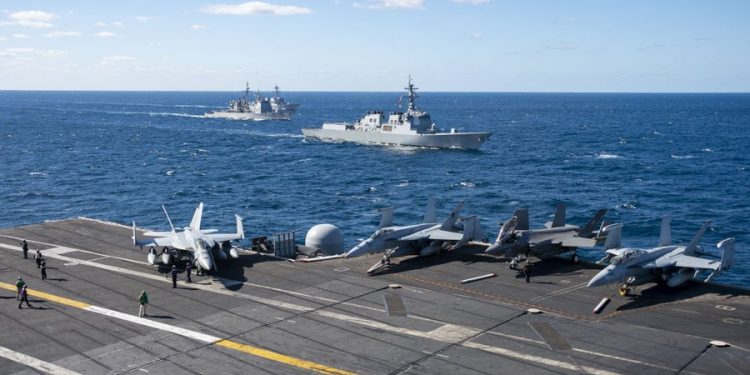The Democratic People’s Republic of Korea (DPRK) has issued a warning regarding the escalating tensions in the Korean Peninsula, largely attributed to the recent increase in military exercises conducted by the trilateral alliance of the United States, Japan, and South Korea. Pyongyang perceives these exercises as a direct threat to its national security and an indication of the aggressive and chauvinistic nature of the Washington-backed blocs.
The United States, along with its allies South Korea and Japan, have intensified their military presence in the region. Recently, they conducted joint naval exercises involving nine warships, including the USS Carl Vinson and USS Princeton, as well as South Korean and Japanese destroyers equipped with the Aegis missile-defense system. These drills, which concluded near South Korea’s Jeju Island, have been described by North Korean leader Kim Jong Un as “invasion rehearsals.”
Moreover, the DPRK has been responsive to these provocations by ramping up its missile testing program. Recently, Pyongyang successfully launched a solid-fuel medium-range ballistic missile equipped with a hypersonic maneuverable controlled warhead. North Korea maintains that these tests are defensive in nature and aimed at safeguarding its sovereignty in light of the provocative drills near its borders.
Kim Jong Un has been vocal in his criticism of the trilateral military alliance, referring to it as a “cancer tumor” that undermines the international UN-based order. He has also declared South Korea as the primary hostile nation, accusing Seoul of pursuing regime collapse and unification by absorption. Kim’s rhetoric underscores the deepening rift between North and South Korea, exacerbated by the military maneuvers of the U.S. and its allies.
The geopolitical climate in the Korean Peninsula has become increasingly volatile with the election of new governments in the U.S. and South Korea. The narrative of the “North Korea threat,” driven by the US and its allies, has led Pyongyang to assert its right to launch a preemptive attack on U.S. strategic forces in South Korea.
The escalating tensions, fueled by military posturing and strategic narratives, pose a significant challenge to regional stability and international peace efforts. The situation continues to evolve, with each side taking measures that they deem necessary for their national security and regional influence.



























